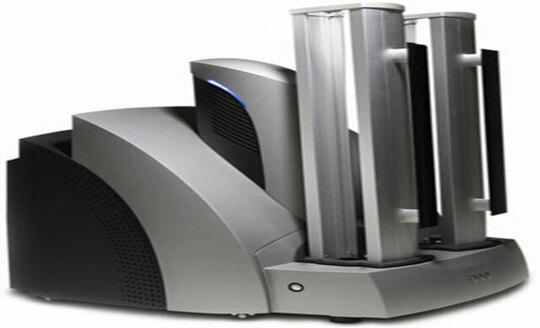Meso Scale Discovery has proprietary technology for measuring molecules in complex biological samples. This technology can help analyze and characterize analytes such as proteins, chemokines, and cytokines, offering a robust tool for drug discovery and development processes.
What is a Meso Scale Discovery assay?
Meso Scale Discovery (MSD) are multiplex assays that combine electrochemiluminescence and multi-array systems to bring a detection tool with exceptional multiplexing capacities and unsurpassed sensitivity. Electrochemiluminescence technology provides a wide dynamic range and enhanced sensitivity in numerous sample types. On the other hand, multi-array plates offer highly dense and rapid analysis of biological samples. Multi-array combined with multi-spot means multiple target analytes are quantified simultaneously in a single sample volume.
With the availability of options such as MSD PK assays and alternatives such as Luminex-based assays, researchers must understand their requirements adequately. Hence following are the five answers to consider while opting for MSD assays.
Are all MesoScale Discovery products available online?
All assay consumables, catalog assay kits, instrument service contacts, and assay development products are available online. Besides, customer service representatives handle all V-Plex special orders and custom orders. Moreover, other services, such as assay development, instrument sales, and prototype printing, are managed by appropriate account representatives. Customers may place quotes for custom assays and special orders through the Custom Assay Quote Request forms.
Is backup available for the WORKBENCH software database?
Yes, the WORKBENCH software has a backup option. Customers can back up data by executing DBUtility.bat in the DOS. First, customers must create a folder to store the backup. Open the DOS window by clicking Start, then Programs, then Accessories and finally Command Prompt. Once the prompt comes up, enter common c\program files\MSD Discovery Workbench\bin and change the directory. Finally, enter the command “dbutility LCPRSchema c:\DB_Backup\MyDBackup.” Remember that the command is case-sensitive.
Can researchers increase assay sensitivity by increasing sample volumes?
In the sample incubation step of Meso Scale assays, around 25-50 μL of sample is required in each well. This volume is the optimal sample volume, which requires approx 1-2 hours of the incubation period. However, researchers can increase the sample volumes to yield higher signals. But, it must be noted that higher volumes mean longer incubation periods are needed to reach equilibrium. Furthermore, MSD mesoscale offers support through Application Scientists when customers require additional sensitivity.
Can R-Plex be used with 384-well plates?
Customers can use a minimum of 10 μL sample per well for a 384-well microplate. Based on the number of wells required for analysis, researchers must calculate the volume of antibody solution that will be needed for the entire analysis. Generally, MSD recommends 4.6 mL or more of coating buffer. Moreover, researchers must also dilute the capture antibody according to the recommended dilutions. Besides, researchers can contact Scientific Support to know more about 96-well and 384-well MSD assays.
Can researchers move their MSD instruments by themselves?
In case relocation is needed, MSD support offers relocation. They will relocate, reinstall and requalify the MSD instrument. Furthermore, the relocation service fee is free of cost at the original site under the Total Service Package when the instrument is installed originally by MSD personnel.



